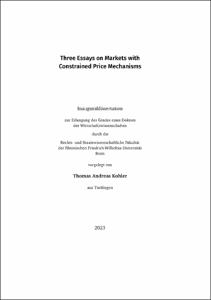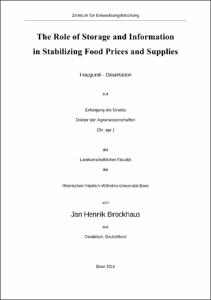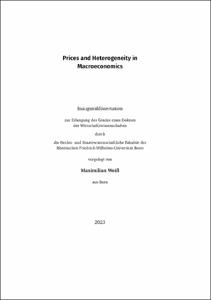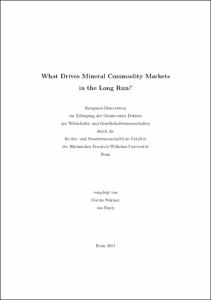Kohler, Thomas Andreas: Three Essays on Markets with Constrained Price Mechanisms. - Bonn, 2023. - Dissertation, Rheinische Friedrich-Wilhelms-Universität Bonn.
Online-Ausgabe in bonndoc: https://nbn-resolving.org/urn:nbn:de:hbz:5-70161
Online-Ausgabe in bonndoc: https://nbn-resolving.org/urn:nbn:de:hbz:5-70161
@phdthesis{handle:20.500.11811/10691,
urn: https://nbn-resolving.org/urn:nbn:de:hbz:5-70161,
author = {{Thomas Andreas Kohler}},
title = {Three Essays on Markets with Constrained Price Mechanisms},
school = {Rheinische Friedrich-Wilhelms-Universität Bonn},
year = 2023,
month = mar,
note = {This dissertation consists of three independent chapters. Their common topic is that they analyze markets in which the prices are not free to adjust, either because of price caps or because of price stickiness.
In the first chapter, I analyze the effects of asymmetric price caps in a duopoly; a special case of which is that only one firm has a price cap. To do so, I incorporate asymmetric price caps into a quantity competition model. A (non-price) rationing rule determines a firm's inverse residual demand function in the presence of price caps, and the price cap makes the inverse residual demand function flat above the price cap. If only one price cap binds, asymmetric price caps induce a trade-off: When adjusting the binding price cap to increase the total quantity, the production gets more unequal across firms, that is, more inefficient.
In the second chapter, Fabian Schmitz and I explain why and how non-compete clauses may be used to undermine the intended effect of minimum wages. Many low-wage workers in the United States have signed non-compete clauses, forbidding them to work for competitors. Empirical research has found a positive correlation between the level of the minimum wage and the prevalence of non-compete clauses. We explain this with moral hazard: By incentivizing more effort, non-compete clauses transfer utility from the agent to the principal. If the minimum wage is sufficiently high, the agent would get a rent without non-compete clauses. With a non-compete clause, the principal can extract this rent at some efficiency loss.
In the third chapter, Maximilian Weiß and I conduct and evaluate a survey about price stickiness among German hairdressers. Surveying managers is a controversial method for finding out why prices are sticky because the results are often too noisy to be useful. By focusing on a single market and asking about the reactions to recent shocks, we reduce the noise in our survey. We find that the desire to retain regular customers is the main source of price stickiness. Furthermore, we find suggestive evidence for the importance of the customers' trust in the firm's commitment to fair pricing.},
url = {https://hdl.handle.net/20.500.11811/10691}
}
urn: https://nbn-resolving.org/urn:nbn:de:hbz:5-70161,
author = {{Thomas Andreas Kohler}},
title = {Three Essays on Markets with Constrained Price Mechanisms},
school = {Rheinische Friedrich-Wilhelms-Universität Bonn},
year = 2023,
month = mar,
note = {This dissertation consists of three independent chapters. Their common topic is that they analyze markets in which the prices are not free to adjust, either because of price caps or because of price stickiness.
In the first chapter, I analyze the effects of asymmetric price caps in a duopoly; a special case of which is that only one firm has a price cap. To do so, I incorporate asymmetric price caps into a quantity competition model. A (non-price) rationing rule determines a firm's inverse residual demand function in the presence of price caps, and the price cap makes the inverse residual demand function flat above the price cap. If only one price cap binds, asymmetric price caps induce a trade-off: When adjusting the binding price cap to increase the total quantity, the production gets more unequal across firms, that is, more inefficient.
In the second chapter, Fabian Schmitz and I explain why and how non-compete clauses may be used to undermine the intended effect of minimum wages. Many low-wage workers in the United States have signed non-compete clauses, forbidding them to work for competitors. Empirical research has found a positive correlation between the level of the minimum wage and the prevalence of non-compete clauses. We explain this with moral hazard: By incentivizing more effort, non-compete clauses transfer utility from the agent to the principal. If the minimum wage is sufficiently high, the agent would get a rent without non-compete clauses. With a non-compete clause, the principal can extract this rent at some efficiency loss.
In the third chapter, Maximilian Weiß and I conduct and evaluate a survey about price stickiness among German hairdressers. Surveying managers is a controversial method for finding out why prices are sticky because the results are often too noisy to be useful. By focusing on a single market and asking about the reactions to recent shocks, we reduce the noise in our survey. We find that the desire to retain regular customers is the main source of price stickiness. Furthermore, we find suggestive evidence for the importance of the customers' trust in the firm's commitment to fair pricing.},
url = {https://hdl.handle.net/20.500.11811/10691}
}









